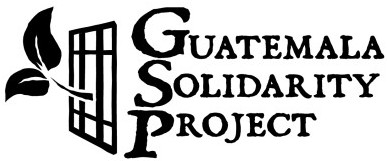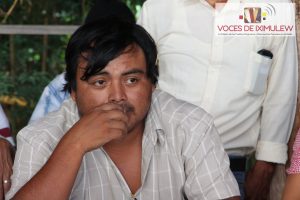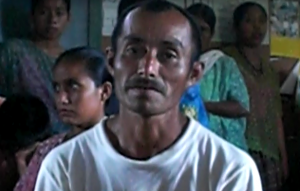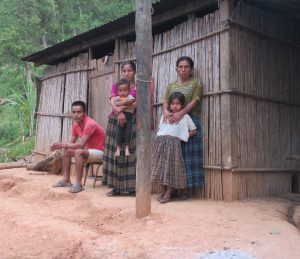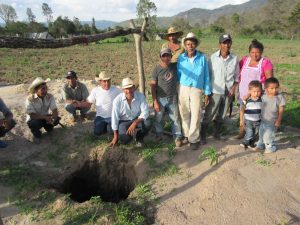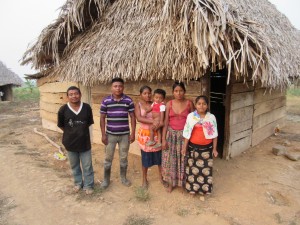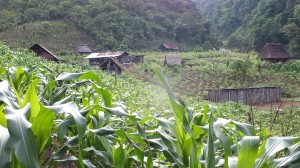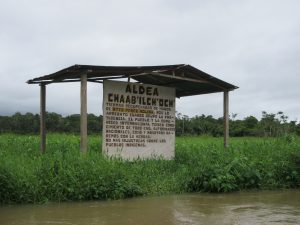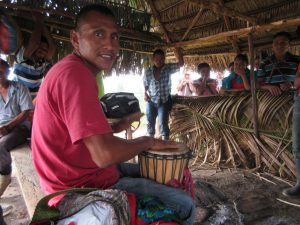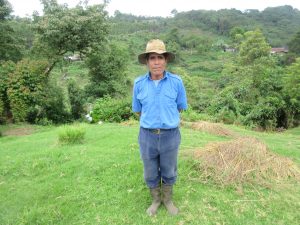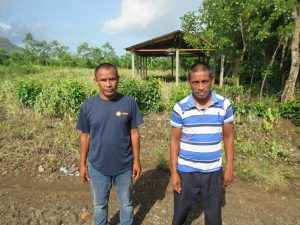An incomplete list of the campaigns we are currently working on:
Freedom for Abelino Chub
Abelino Chub Caal is a longtime indigenous q’eqchi’ activist and friend of the GSP. When he refused to take a bribe from a banana company that is stealing indigenous lands, an arrest warrant was placed against him on false charges. He was arrested on February 4, 2017 while celebrating his birthday with his wife and two young children. At a hearing on June 5, the prosecution said that they had no evidence against him and that he should be released. Nevertheless the judge refused to release him from prison. Read action alert from July 12, 2017
Nonviolent Defense of the Oxec and Cahobon Rivers
The Oxec and Cahobon rivers are sacred to the indigenous people of the municipality of Cahobon in Alta Verapaz, Guatemala. They are under extreme threat from multinational corporations seeking to profit from the rerouting of these rivers and destruction of local ecosystems in order to build hydroelectric damns. Activists have faced significant violence, threats and judicial oppression for organizing in nonviolent defense of these rivers. We are working with area leaders and communities to pressure the government to hold a referendum about the damns as required by Guatemalan and international law.
Freedom for Pablo Sacrab, Justice for Saquimo Setana
Pablo Sacrab Pop was arrested on December 28, 2010 and is completing his fifth difficult year of prison in Coban. His crime was being a community leader with the Committee of Peasant Unity and participating in nonviolent demonstrations supporting the land rights of indigenous q’eqchi’ communities. Sign the petition demanding freedom for Pablo Sacrab and justice for his community Saquimo Setana! Read more and view videos about Saquimo Setana.
Clean Water in the Polochic Valley
In 2011 the Guatemalan government sent military and police to burn down the homes and crops of thousands of q’eqchi’ civilians in the valley. As a result we have seen people from these communities die of starvation. More commonly children have suffered the serious consequences of chronic malnutrition, which include stunted brain development and greater vulnerability to infection and disease. It is disgusting and unacceptable that this is happening in a valley where the soil is so rich and there is no reason for a lack of food. Waterborne illnesses are significantly exacerbating the situation, and local leaders requested the GSP organize to purchase locally made, environmentally sensible water filter. Read more and view videos about the struggle of Polochic Valley communities
End Attacks Against Indigenous Community Rincón de San Valentín
The Guatemala Solidarity Project calls for action in solidarity with the indigenous peasant community Rincon de San Valentin in the municipality of Purulha, Baja Verapaz, Guatemala. Families in the community are facing ongoing violence and threats in attempts to steal land that is rightfully theirs. The government has ordered an eviction of the community and has issued arrest warrants against at least 14 community members. Take action in solidarity with Rincón de San Valentín
Cancel Eviction and Arrest Warrants in indigenous Poqomchi community Balamche
After generations of living and working on a plantation for almost no pay, the indigenous Poqomchi community Balamche was relocated to make room for a hydroelectric damn. Now they are facing an eviction order and every father in the community has an arrest warrant on fraudulent charges. The relocation and constant threats has provoked extreme poverty and hunger in the community. We will be collaborating closely with the community and local organizations to cancel the eviction order and arrest warrants. They have also asked for our support to build a school in the community. Your donations will help us reach these goals. Please consider making a donation of any size; all funds to go our partners in Guatemala.
Freedom for Manuel Xuc Cucul
Manuel Xuc Cucul is a political prisoner who was arrested during the March 2011 attacks against indigenous communities in the Polochic Valley. During these attacks, which the government labeled “legal evictions,” the homes of thousands of indigenous people were burned to the ground and community leader Antonio Beb Ac was murdered. Xuc Cucul has been in prison on fraudulent charges since this time. The GSP is collaborating with the Committee of Peasant Unity to fight in the courts for his freedom. We are also supporting him and other political prisoners on a monthly basis with food, medicine and other needs. Please donate to help this effort.
Land Rights for El Cuje
The worker-reclaimed plantation land of El Cuje is renamed in honor of the local shade tree to separate it from its previous name used by the former land owners. In 2014, the municipal government of Jalapa recognized the indigenous workers’ claim to the land. Sixty families took the land and transformed it from an industrial tomato plantation to a home for community owned food production. In the last harvest, the community was able to solve 80% of their hunger, but remain struggling to leave poverty, retain the land they already have, and recover the remaining two thirds to which they have a right. Despite having legal right to the land, the community is under extreme threats from organized land owners and narco-traffickers in the area. In addition, there is no electricity provided to the area and the river is low. Still, the GSP is inspired to see the strength and courage of a community that were once mistreated workers now owning their own plots. The community has asked us to help them build a school. Please stand with us by making a tax-deductible donation.
Respect for the Territorial Rights of the Microregion Panima
The micro region Panima is a group of eight indigenous q’eqchi’ and poqomchi communities in the municipality of Purulha, Baja Verapaz. The region is rich in water resources, and has been targeted by multinational energy companies seeking to reroute rivers and flood indigenous lands to create hydroelectric damns. These damns destroy local ecosystems, leave local communities without electricity, and connect to international electricity grids to generate enormous profit for a small wealthy elite. The damns have already caused significant damage in the region. We are organizing with these communities in nonviolent defense of their territory.
Land Rights and Justice for Chicoyoguito
Chicoyoguito was a plantation in Coban in which thousands of indigenous q’eqchi’ people lived and were forced to work. In 1968 these people were violently evicted and many were murdered as the land was converted into a military base. Now the families are trying to get the land back. They have been displaced to various parts of the region, but come together regularly to meet and advance their struggle. Under the Peace Accords they should have the right to return to their lands. On Friday July 28, 2017 they will have a march from the monument in Coban to CREOMPAZ, the name of the military base that was once their land. They’ve done this march on July 28th several years in a row already. But they’ve only ever been able to get to the gate, not inside. The GSP is looking to increase our collaboration with the community. We have already worked with activists and organizations to support the exhumation of hundreds of cadavers from clandestine graves inside the military base. Many show signs of extreme torture.
Respect for the Territorial Rights of the Community Monte Blanco
In 2012, a hydroelectric damn was built on indigenous territory without consulting the families of the community Monte Blanco. This construction has included the rerouting of rivers and destruction of forest and mountain lands to build new roads as part of the damn construction. The rerouting of rivers has caused significant damage to the community, leaving many without water access for drinking, bathing and crop irrigation. Frequently the water is rerouted to clean damn infrastructure, causing flooding and destruction of crops. The community has asked for our support in challenging the legality of the damn’s activities.
Medical Support for Martin Pec
Martin Pec (far left) and his family in front of their house
Martin Pec is a q’eqchi’ community leader. In the middle of the night of August 9, 2011, dozens of heavily armed masked men attacked the community Parana. They burned down homes, clothes and harvested corn. Three community members were shot, including an 8 year old girl. Pec was shot in the stomach and brought to an intensive care hospital unit. Instead of being given quality care, he was arrested on false charges while in his hospital bed and transferred to jail. Pressure from Guatemalan activists and international solidarity groups like the GSP led to his release from jail weeks later. However, six years later Pec has little energy, needs to use a colostomy bag and is still trying to access a doctor.
Land and Water for Mezcal
Mezcal is a large plantation where indigenous families were forced to work for generations. These families are now organizing to access this land as back payment for decades of slavery like conditions. Their struggle is supported by Guatemalan law, but not the Guatemalan government. The community has been without a water source for five years. Because the community has strong legal evidence of their case, we hope to help them contract a lawyer and gain access to land. Please help by making a donation of any size.
End Eviction Order against Tierra Nueva
The indigenous community Tierra Nueva purchased land with the support of large loans that they have not been able to fully pay. They are now facing an eviction order that will leave them with no place to go. The original loan was unjust because it did not take into consideration the extreme poverty of the community, included excessive interest rates, and there was not a realistic opportunity for the community to make payments. The community had to accept the loan because they had no place to live. They have nevertheless paid off approximately half of the original loan. There is currently a government recognized school in the community, adding to the absurdity of the eviction order. The eviction order also doesn’t take into account the decades of work the community has done improving the land, including developing a valuable cardamom crop.
Land Rights for La Cumbre Sa’kuxha
High on a mountain above the clouds and under the red flag of the Committee of Peasant Unity, the GSP first met with almost the entire community of 24 Q’eqchi’ families in La Cumbre Sa’kuxha to learn of their fight for land. Since then we have returned numerous times. Families had worked for generations on the plantation without receiving pay. When they organized in the 1990s to demand a salary, they were violently evicted. From 2008-2010 they met every week to organize a return to the land. On November 25, 2010, they reentered the land they were born on. Their basic rights still have not been recognized.
‘After we were displaced from the land, we met every night, and little by little we organized and united in the CUC until we were ready to take it back’
– Community leader José Caal Cho
Land Rights for Chab’il Ch’och’
Chab’il Ch’och’ (Good land) is an indigenous q’eqchi’ community formed in August, 2016. Former President and General Otto Perez Molina stole these ancestral indigenous lands during his Presidency and used them for vacations as well as drug trafficking. The community occupied the lands because of their poverty, need for land and belief that indigenous people have a right to their ancestral territory. We stand with them in support of their right to land, as well as a school and health clinic.
Land Rights for Repollal Suquinai II
“I am 70 years old, and I was born here. My Dad lived to be over 70 years od, and he was born here as well. During the war, armed groups took our land titles. Now armed groups are trying to take the land from us. We want help to investigate the registry of the land. They are going to destroy the water, the trees, the soil and that is why we are defending this land from the mining companies.”
Families in the community Repollal Suquinai II were forced to work on a local plantation for generations. Under Guatemalan law, they have legal right to their land, but armed groups are steadily pushing back the boundaries of the community. It is believed that mining companies are behind the aggression as recent studies suggest their may be gold deep within the mountain. The local government recognizes the community, but does not provide its children with a school. We will be working with the community to prevent further violence and looting of their territory.
Land Rights for Santa Maria
Santa Maria is an indigenous q’eqchi’ community in Panzos, Alta Verapaz. They are organizing with the Committee of Peasant Unity to recuperate indigenous lands from sugar cane, rubber and African Palm plantations. They have faced significant threats and violence, including an armed attack in 2013 that left several people seriously injured. Among the injuries were Martin Zacarias Tut Tzi (above left), who was beaten unconscious, and Hector Animal Pop Coc above right), who was shot in the face and arm and needed surgery to remove projectiles. Several people are still in need of medical support to remove projectiles from the 2013 attack. The GSP is collaborating with the community to support their access to land, clean water and a school.
Close the SOA!
From November 10-12, 2017, the GSP will join torture survivors, union workers, religious communities, musicians, puppetistas, students, migrants, veterans and thousands of activists to oppose violence and militarization and celebrate resistance. As we call attention to the militarization of the border and Latin America, we also call for an end to state-sponsored terrorism and violence against our communities inside the United States. Similarly, the mobilization at the border in Nogales is one more way to fight for the closure of the School of the Americas/WHINSEC and put an end to U.S. intervention in Latin America.
